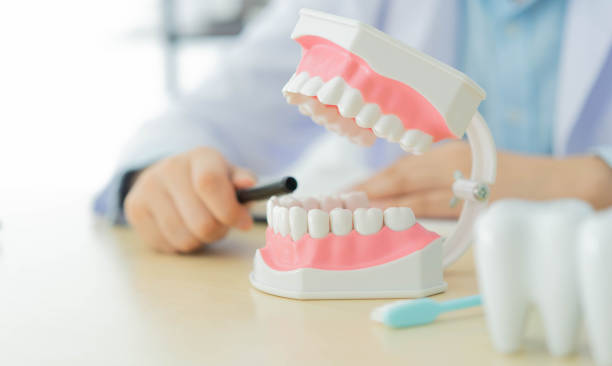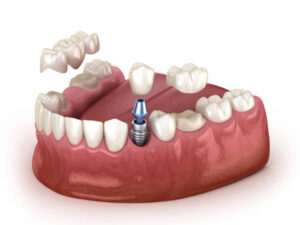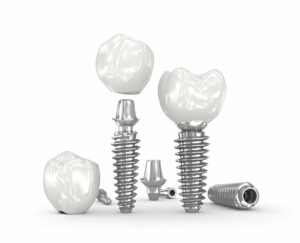Choosing between dentures and dental implants is a big decision. It’s crucial when replacing missing teeth. Each option has good and bad points. Understanding them can help you choose the best one for your oral health. Let’s explore the key aspects of dentures and implants to see which one might be better for you.
What Are Dentures?
Dentures are removable prosthetic teeth designed to fit comfortably in your mouth. They can replace all the teeth in your upper or lower jaw (full dentures) or just a few missing teeth (partial dentures).
Pros of Dentures:
- Dentures are cheaper than implants. They are a good choice for those on a budget.
- Dentures are non-invasive. Getting them does not involve surgery. This can be less scary and easier to handle.
- Repairable: Dentures can be easily adjusted or repaired if they become damaged or no longer fit properly.
Cons of Dentures:
- Dentures might slip while eating or speaking if not secured with adhesive. This can be uncomfortable and embarrassing.
- Impact on Speech and Taste: Dentures can affect how you speak and alter the taste of food.
- Maintenance: Dentures require daily cleaning and must be removed overnight. Neglecting this can lead to gum infections and bone deterioration.
- Partial dentures can harm nearby teeth. They can make them prone to decay and gum problems.
What Are Dental Implants?
Dental implants are permanent replacements for missing teeth. A metal post is surgically implanted into the jawbone, and a crown is attached to function as a natural tooth.
Pros of Dental Implants:
- Longevity: Implants can last over 20 years, offering a long-term solution to tooth loss.
- Natural Appearance: Implants look and feel like natural teeth and do not need to be removed for cleaning.
- Jawbone Preservation: Implants help maintain the jawbone’s structure, preventing deterioration over time.
Cons of Dental Implants:
- Cost: Implants are more expensive than dentures due to the surgical procedures involved.
- Implant surgery is invasive. It can be daunting and needs enough jaw bone.
Factors to Consider
When choosing between dentures and implants, several factors come into play. These include age, bone density, comfort, and hygiene.
Age
- Implants: Ideal for individuals in their 60s or younger due to their long-term benefits.
- Dentures: May be preferred by older adults who want a less invasive procedure.
Bone Density
- Implants: Require a sufficient amount of jawbone. Bone grafting may be necessary for those with bone loss, adding complexity and cost.
- Dentures: Suitable for those with weak or unhealthy jaws as they do not require bone support.
Comfort and Functionality
- Implants: Provide better comfort and chewing efficiency. They feel like natural teeth and do not slip.
- Dentures: May be less comfortable and require adhesive for stability. Implant-supported overdentures can offer a middle ground.
Hygiene
- Implants: Require standard dental care like natural teeth, including brushing and flossing.
- Dentures: Need to be removed and cleaned daily. Improper maintenance can lead to infections and decay.
Alternatives to Consider
Besides dentures and implants, other options include:
- Dental Bridges: Attach to surrounding teeth for support and are suitable for those missing one or more teeth.
- Temporary Partial Dentures (Flippers): Removable devices used while waiting for implants or bridges.
- Snap-in Dentures (Overdentures): A hybrid of dentures and implants, offering stability without adhesive.
Conclusion
The choice between dentures and implants is personal. It depends on your needs, budget, and preferences. Dentures are cost-effective and non-invasive, while implants offer a long-lasting, natural-looking solution. Talking to your dentist is crucial to making the right decision. You should consider factors like age, bone density, comfort, and hygiene.
Take Action: Contact Aberdeen Dental Implant Clinic
For any concerns about dentures, dental implants, or other dental issues, contact Aberdeen Dental Implant Clinic. Our experienced team is ready to provide you with personalised guidance to make the best decision for your oral health and overall well-being. Call us today to schedule an appointment and regain your confident smile
Frequently Asked Question
Can dentures and implants be combined?
Implant-supported dentures offer both stability from implants and the convenience of removable dentures.
How long do dental implants last?
With proper care, dental implants can last over 20 years.
Are there any risks associated with dental implants?
Risks include infection and mechanical problems. Additional procedures, like bone grafting, may be needed.
Do dentures need to be replaced?
Yes, dentures typically need replacement every 5 to 7 years due to wear and changes in mouth structure.
Can I eat normally with dentures or implants?
Implants allow for natural eating. But, dentures may need adjustments and adhesive for stability.





